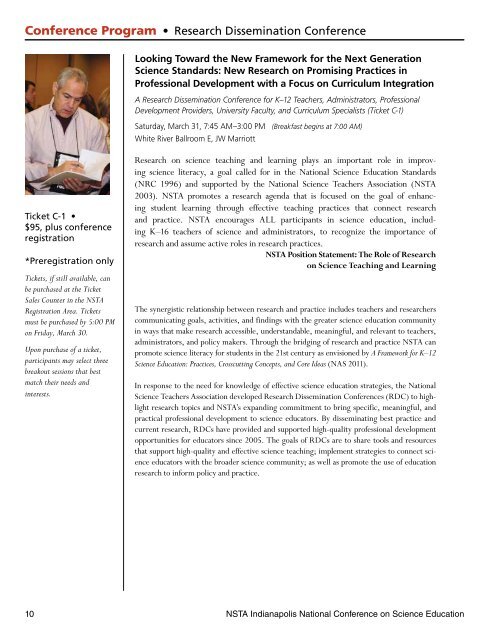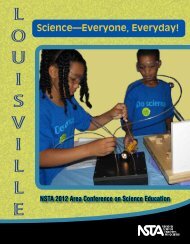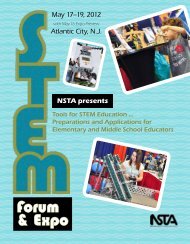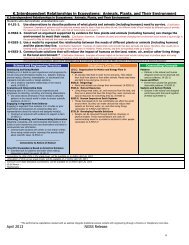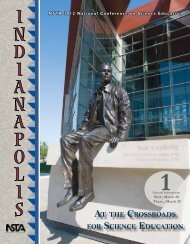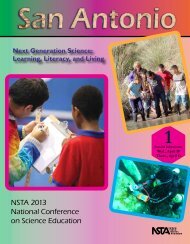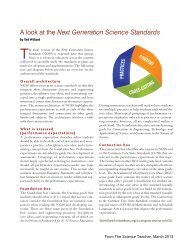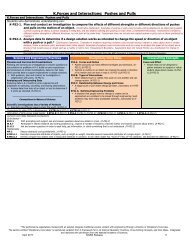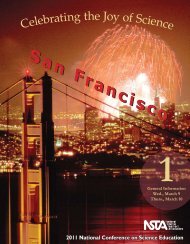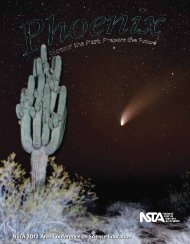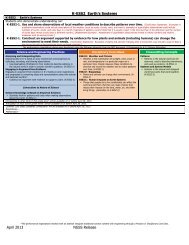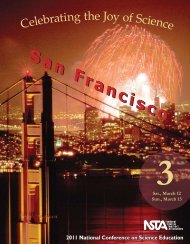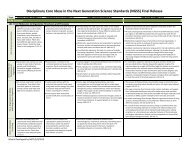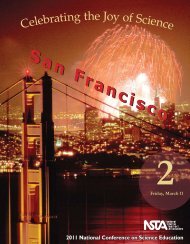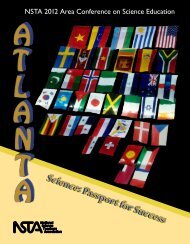Saturday/Sunday
Saturday/Sunday
Saturday/Sunday
You also want an ePaper? Increase the reach of your titles
YUMPU automatically turns print PDFs into web optimized ePapers that Google loves.
Conference Program • Special Research Programs Dissemination Conference<br />
Looking Toward the New Framework for the Next Generation<br />
Science Standards: New Research on Promising Practices in<br />
Professional Development with a Focus on Curriculum Integration<br />
A Research Dissemination Conference for K–12 Teachers, Administrators, Professional<br />
Development Providers, University Faculty, and Curriculum Specialists (Ticket C-1)<br />
<strong>Saturday</strong>, March 31, 7:45 AM–3:00 PM (Breakfast begins at 7:00 AM)<br />
White River Ballroom E, JW Marriott<br />
Ticket C-1 •<br />
$95, plus conference<br />
registration<br />
*Preregistration only<br />
Tickets, if still available, can<br />
be purchased at the Ticket<br />
Sales Counter in the NSTA<br />
Registration Area. Tickets<br />
must be purchased by 5:00 PM<br />
on Friday, March 30.<br />
Upon purchase of a ticket,<br />
participants may select three<br />
breakout sessions that best<br />
match their needs and<br />
interests.<br />
Research on science teaching and learning plays an important role in improving<br />
science literacy, a goal called for in the National Science Education Standards<br />
(NRC 1996) and supported by the National Science Teachers Association (NSTA<br />
2003). NSTA promotes a research agenda that is focused on the goal of enhancing<br />
student learning through effective teaching practices that connect research<br />
and practice. NSTA encourages ALL participants in science education, including<br />
K–16 teachers of science and administrators, to recognize the importance of<br />
research and assume active roles in research practices.<br />
NSTA Position Statement: The Role of Research<br />
on Science Teaching and Learning<br />
The synergistic relationship between research and practice includes teachers and researchers<br />
communicating goals, activities, and findings with the greater science education community<br />
in ways that make research accessible, understandable, meaningful, and relevant to teachers,<br />
administrators, and policy makers. Through the bridging of research and practice NSTA can<br />
promote science literacy for students in the 21st century as envisioned by A Framework for K–12<br />
Science Education: Practices, Crosscutting Concepts, and Core Ideas (NAS 2011).<br />
In response to the need for knowledge of effective science education strategies, the National<br />
Science Teachers Association developed Research Dissemination Conferences (RDC) to highlight<br />
research topics and NSTA’s expanding commitment to bring specific, meaningful, and<br />
practical professional development to science educators. By disseminating best practice and<br />
current research, RDCs have provided and supported high-quality professional development<br />
opportunities for educators since 2005. The goals of RDCs are to share tools and resources<br />
that support high-quality and effective science teaching; implement strategies to connect science<br />
educators with the broader science community; as well as promote the use of education<br />
research to inform policy and practice.<br />
10 NSTA Indianapolis National Conference on Science Education


